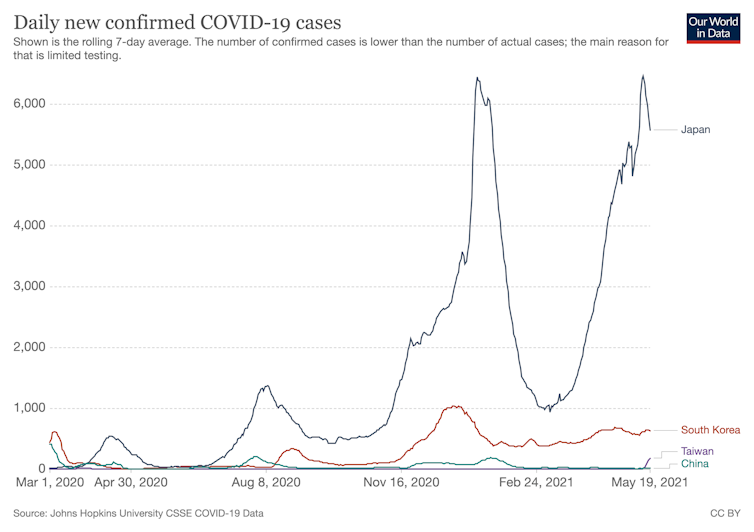By /The Conversation/ – As Japan suffers a fourth wave of COVID-19, domestic opposition to the summer Olympic and Paralympic games is mounting. Two new opinion polls, showing that between 60% and 80% want the games either cancelled or postponed, have triggered a frenzy of articles all asking the same question: will the Olympics be cancelled?
We’ve been here before – and not just last year, when the Tokyo games were originally intended to take place. Throughout the spring there have been rumours and leaks that the Olympics would not take place. These have been quashed each time by both the International Olympic Committee (IOC) and the Japanese government, led by Prime Minister Yoshihide Suga.
The latest opinion polls are the clearest sign yet that the public has turned resolutely against the summer games. This is an election year – Suga’s first since taking over from predecessor Shinzō Abe – and there is no doubt that these polls are bad news for both the prime minister and his ruling Liberal Democratic Party (LDP).
Still, if I were an Olympic athlete (I’m definitely not an Olympic athlete), I would not stop training just yet. That’s because the decision to cancel or go ahead with the games is not a simple question of infection rates. Rather, it is about politics and money – vast sums of money.
Does public opinion matter?
Japan is currently fighting a fourth wave of the pandemic and several regions are in a state of emergency, though national infection numbers are now decreasing.
From a western perspective, Japan has enjoyed great success in containing the spread of COVID-19. Like its neighbours South Korea and Taiwan, Japan recognised the airborne nature of the virus early. Immediate and widespread mask-use, aggressive contact-tracing, and an early lockdown of elderly care have all been credited with Japan’s success in keeping the death toll relatively low, at 11,900.

But compared with its neighbouring Taiwan and South Korea, Japan’s performance looks less impressive. The government was widely criticised for encouraging domestic tourism in the middle of the third wave. Meanwhile, Japan’s vaccine rollout is one of the slowest in the OECD. And now, these opinion polls show clear majorities against the summer games. The question is, does public opinion really matter?
Japan has an extremely low voter turn-out. Combined with the peculiarities of the electoral system, this means that the LDP does not have to win anything close to a majority of eligible voters in order to retain power. At the last general election, while only 25% percent of eligible voters chose the LDP, this gave them 60% of the seats in parliament .
Simply put, while public opinion matters, it is not decisive. Some opposition leaders have come out against the games, but overall the opposition is weak and divided. The LDP has been in power for 61 of the last 65 years and has a long history of defying public opinion on major domestic issues and still winning re-election.
Read the full story on The Conversation





